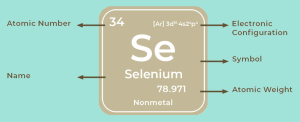Selenium is an essential trace element. For our bodies and our immune systems to function well, we need adequate intakes of selenium. Our bodies cannot produce selenium. We need to get it in our diets [Cleveland Clinic 2023].

Who might need a selenium supplement? The answer depends where one lives. It depends upon how selenium-rich or selenium-poor the soil and the foodstuffs are in the local region. In much of North America, for example, the inhabitants generally do not need a selenium supplement. The reason: the soil and the food grown in the soil in much of North America provide adequate amounts of selenium [Cleveland Clinic 2023].
Conversely, there is a greater likelihood that people living in much of Europe and in some Middle Eastern countries will need a selenium supplement. In a systematic review, Stoffaneller & Morse documented widespread sub-optimal selenium intake and status throughout Europe, the UK, and the Middle East [Stoffaneller & Morse 2015].
Health Benefits of Optimal Selenium Status
According to the Cleveland Clinic [2023], optimal selenium status plays a role in the following aspects of good health:
- protects cells from damage
- protects reproductive function
- supports thyroid function
- supports DNA synthesis
In addition, optimal selenium intake and status may help in the management of chronic asthma and may protect against the development of some forms of cancer [Cleveland Clinic 2023].
Optimal Daily Selenium Intake
To the question how much selenium do we need on a daily basis, we can find estimated answers from two studies:
1) In a study of the effect of selenium supplementation on thyroid function, Larsen et al say that serum selenium status needs to be in the range of 120-130 mcg/L. To achieve this serum concentration, the necessary selenium intake is at least 100 mcg per day.
Why is serum selenium status of at least 120-130 mcg/L important? Because that is the serum selenium concentration at which the serum concentration of selenoprotein P reached an optimal level. Selenoprotein P is especially important for the transport and distribution of selenium in the blood circulation to the tissues [Larsen 2024].
2) In a cohort study, Bomer et al reported that many patients with worsening heart failure have a serum selenium concentration lower than 70 mcg/L. Moreover, heart failure patients with serum selenium concentrations of 70–100 mcg/L appeared to have similar adverse associations: poorer quality of life, poorer exercise capacity, and poorer prognosis. This study outcome suggests that serum selenium values below 100 mcg/L might be considered abnormal [Bomer 2020].
Conclusion: Low Serum Selenium and Health Risks
Many people seem not to be aware of the need for an optimal intake of selenium.
The health risks of selenium deficiency are too often neglected [Schomburg 2021].
Meanwhile, possible side effects of selenium supplementation are sometimes exaggerated. The result is a general disregard for promising preventive and adjuvant treatment options [Schomburg 2021].
Sources
Bomer N, Grote Beverborg N, Hoes MF, Streng KW, Vermeer M, Dokter MM, IJmker J, Anker SD, Cleland JGF, Hillege HL, Lang CC, Ng LL, Samani NJ, Tromp J, van Veldhuisen DJ, Touw DJ, Voors AA, van der Meer P. Selenium and outcome in heart failure. Eur J Heart Fail. 2020 Aug;22(8):1415-1423.
Cleveland Clinic. What Selenium Is and Why You Need It (But Not Too Much of It). Cleveland Clinic Health Essentials. 31 May 2023. Retrieved from https://health.clevelandclinic.org/selenium-benefits
Larsen C, Winther KH, Cramon PK, Rasmussen ÅK, Feldt-Rasmusssen U, Knudsen NJ, Bjorner JB, Schomburg L, Demircan K, Chillon TS, Gram J, Hansen SG, Brandt F, Nygaard B, Watt T, Hegedus L, Bonnema SJ. Selenium supplementation and placebo are equally effective in improving quality of life in patients with hypothyroidism. Eur Thyroid J. 2024 Jan 1;13(1):e230175.
Schomburg L. Selenium deficiency due to diet, pregnancy, severe illness, or covid-19-a preventable trigger for autoimmune disease. Int J Mol Sci. 2021 Aug 8;22(16):8532.
Stoffaneller R, Morse NL. A review of dietary selenium intake and selenium status in Europe and the Middle East. Nutrients. 2015 Feb 27;7(3):1494-537.
The information presented in this review article is not intended as medical advice. It should not be used as such.
